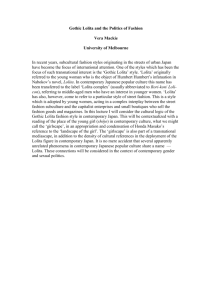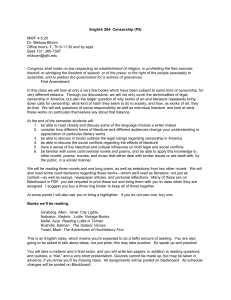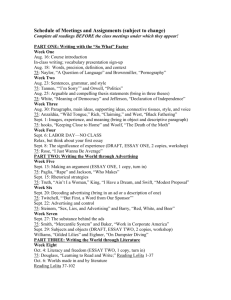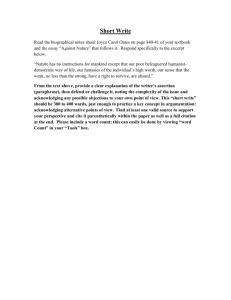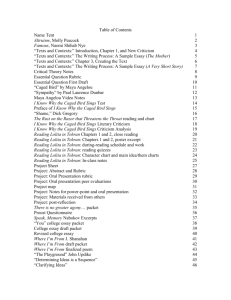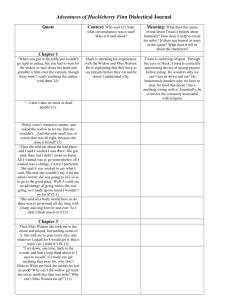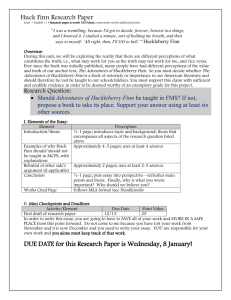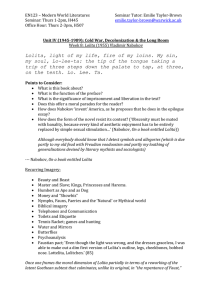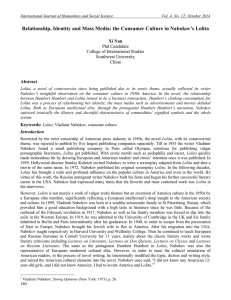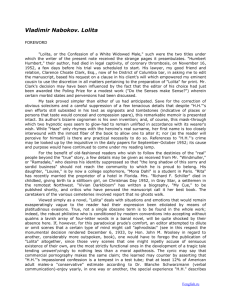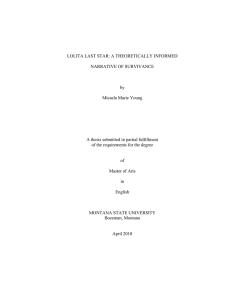Excerpts from Chapter 31, The Adventures of Huckleberry Finn
advertisement
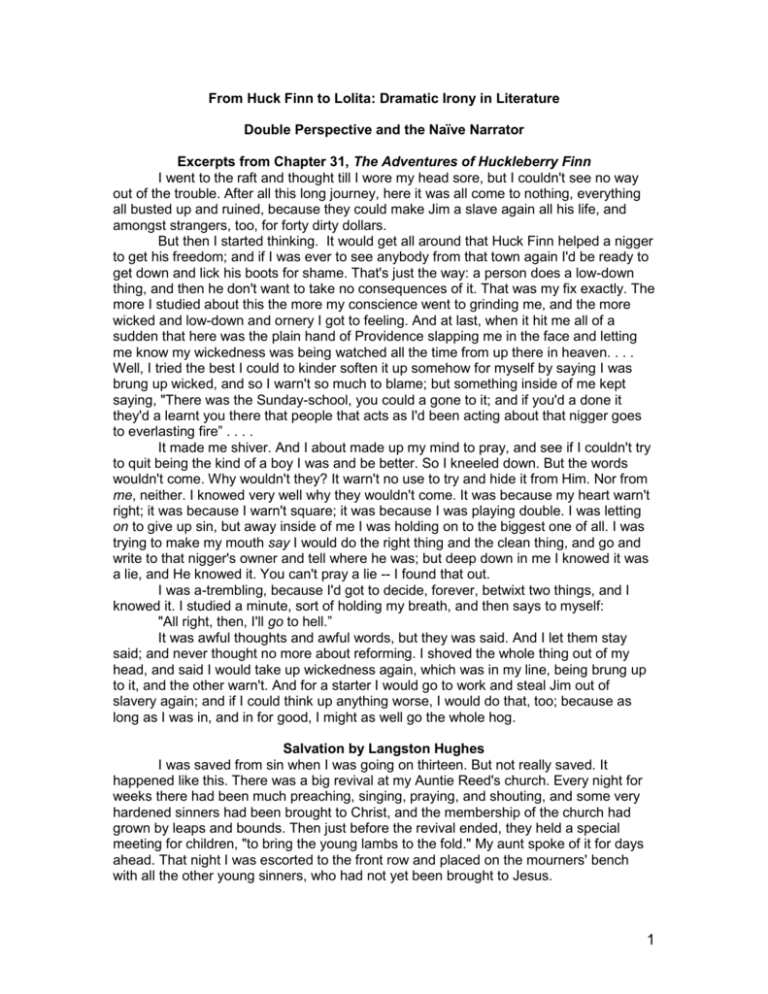
From Huck Finn to Lolita: Dramatic Irony in Literature Double Perspective and the Naïve Narrator Excerpts from Chapter 31, The Adventures of Huckleberry Finn I went to the raft and thought till I wore my head sore, but I couldn't see no way out of the trouble. After all this long journey, here it was all come to nothing, everything all busted up and ruined, because they could make Jim a slave again all his life, and amongst strangers, too, for forty dirty dollars. But then I started thinking. It would get all around that Huck Finn helped a nigger to get his freedom; and if I was ever to see anybody from that town again I'd be ready to get down and lick his boots for shame. That's just the way: a person does a low-down thing, and then he don't want to take no consequences of it. That was my fix exactly. The more I studied about this the more my conscience went to grinding me, and the more wicked and low-down and ornery I got to feeling. And at last, when it hit me all of a sudden that here was the plain hand of Providence slapping me in the face and letting me know my wickedness was being watched all the time from up there in heaven. . . . Well, I tried the best I could to kinder soften it up somehow for myself by saying I was brung up wicked, and so I warn't so much to blame; but something inside of me kept saying, "There was the Sunday-school, you could a gone to it; and if you'd a done it they'd a learnt you there that people that acts as I'd been acting about that nigger goes to everlasting fire” . . . . It made me shiver. And I about made up my mind to pray, and see if I couldn't try to quit being the kind of a boy I was and be better. So I kneeled down. But the words wouldn't come. Why wouldn't they? It warn't no use to try and hide it from Him. Nor from me, neither. I knowed very well why they wouldn't come. It was because my heart warn't right; it was because I warn't square; it was because I was playing double. I was letting on to give up sin, but away inside of me I was holding on to the biggest one of all. I was trying to make my mouth say I would do the right thing and the clean thing, and go and write to that nigger's owner and tell where he was; but deep down in me I knowed it was a lie, and He knowed it. You can't pray a lie -- I found that out. I was a-trembling, because I'd got to decide, forever, betwixt two things, and I knowed it. I studied a minute, sort of holding my breath, and then says to myself: "All right, then, I'll go to hell.” It was awful thoughts and awful words, but they was said. And I let them stay said; and never thought no more about reforming. I shoved the whole thing out of my head, and said I would take up wickedness again, which was in my line, being brung up to it, and the other warn't. And for a starter I would go to work and steal Jim out of slavery again; and if I could think up anything worse, I would do that, too; because as long as I was in, and in for good, I might as well go the whole hog. Salvation by Langston Hughes I was saved from sin when I was going on thirteen. But not really saved. It happened like this. There was a big revival at my Auntie Reed's church. Every night for weeks there had been much preaching, singing, praying, and shouting, and some very hardened sinners had been brought to Christ, and the membership of the church had grown by leaps and bounds. Then just before the revival ended, they held a special meeting for children, "to bring the young lambs to the fold." My aunt spoke of it for days ahead. That night I was escorted to the front row and placed on the mourners' bench with all the other young sinners, who had not yet been brought to Jesus. 1 My aunt told me that when you were saved you saw a light, and something happened to you inside! And Jesus came into your life! And God was with you from then on! She said you could see and hear and feel Jesus in your soul. I believed her. I had heard a great many old people say the same thing and it seemed to me they ought to know. So I sat there calmly in the hot, crowded church, waiting for Jesus to come to me. “Araby,” James Joyce When the short days of winter came dusk fell before we had well eaten our dinners. When we met in the street the houses had grown sombre. The space of sky above us was the colour of ever-changing violet and towards it the lamps of the street lifted their feeble lanterns. The cold air stung us and we played till our bodies glowed. Our shouts echoed in the silent street. The career of our play brought us through the dark muddy lanes behind the houses where we ran the gauntlet of the rough tribes from the cottages, to the back doors of the dark dripping gardens where odours arose from the ashpits, to the dark odorous stables where a coachman smoothed and combed the horse or shook music from the buckled harness. When we returned to the street light from the kitchen windows had filled the areas. If my uncle was seen turning the corner we hid in the shadow until we had seen him safely housed. Or if Mangan's sister came out on the doorstep to call her brother in to his tea we watched her from our shadow peer up and down the street. We waited to see whether she would remain or go in and, if she remained, we left our shadow and walked up to Mangan's steps resignedly. She was waiting for us, her figure defined by the light from the half-opened door. Her brother always teased her before he obeyed and I stood by the railings looking at her. Her dress swung as she moved her body and the soft rope of her hair tossed from side to side. Her image accompanied me even in places the most hostile to romance. On Saturday evenings when my aunt went marketing I had to go to carry some of the parcels. We walked through the flaring streets, jostled by drunken men and bargaining women, amid the curses of labourers, the shrill litanies of shop-boys who stood on guard by the barrels of pigs' cheeks, the nasal chanting of street-singers, who sang a come-allyou about O'Donovan Rossa, or a ballad about the troubles in our native land. These noises converged in a single sensation of life for me: I imagined that I bore my chalice safely through a throng of foes. Her name sprang to my lips at moments in strange prayers and praises which I myself did not understand. My eyes were often full of tears (I could not tell why) and at times a flood from my heart seemed to pour itself out into my bosom. I thought little of the future. I did not know whether I would ever speak to her or not or, if I spoke to her, how I could tell her of my confused adoration. But my body was like a harp and her words and gestures were like fingers running upon the wires. J.D. Salinger, The Catcher in the Rye If you really want to hear about it, the first thing you’ll probably want to know is where I was born, and what my lousy childhood was like, and how my parents were occupied and all before they had me, and all that David Copperfield kind of crap, but I don’t feel like going into it, if you want to know the truth. 2 Double Perspective and the Unreliable Narrator Narrator Nick Carraway, opening of Fitzgerald’s The Great Gatsby I'm inclined to reserve all judgments, a habit that has opened up many curious natures to me and also made me the victim of not a few veteran bores. The abnormal mind is quick to detect and attach itself to this quality when it appears in a normal person, and so it came about that in college I was unjustly accused of being a politician, because I was privy to the secret griefs of wild, unknown men. Most of the confidences were unsought--frequently I have feigned sleep, preoccupation, or a hostile levity when I realized by some unmistakable sign that an intimate revelation was quivering on the horizon--for the intimate revelations of young men or at least the terms in which they express them are usually plagiaristic and marred by obvious suppressions. Reserving judgments is a matter of infinite hope. I am still a little afraid of missing something if I forget that, as my father snobbishly suggested, and I snobbishly repeat a sense of the fundamental decencies is parceled out unequally at birth. Lolita, Vladmir Nabokov The median age of pubescence for girls has been found to be thirteen years and nine months in New York and Chicago. The age varies for individuals from ten, or earlier, to seventeen. Virginia was not quite fourteen when Harry Edgar possessed her. He gave her lessons in algebra. Je m'imagine cela. They spent their honeymoon at Petersburg, Fla. . . . I have all the characteristics which, according to writers on the sex interests of children, start the responses stirring in a little girl: clean-cut jaw, muscular hand, deep sonorous voice, broad shoulder. Moreover, I am said to resemble some crooner or actor chap on whom Lo has a crush. I am lanky, big-boned, wooly-chested Humbert Humbert, with thick black eyebrows and a queer accent, and a cesspoolful of rotting monsters behind his slow boyish smile. And neither is she the fragile child of a feminine novel. What drives me insane is the twofold nature of this nymphet--of every nymphet, perhaps; this mixture in my Lolita of tender dreamy childishness and a kind of eerie vulgarity, stemming from the snub-nosed cuteness of ads and magazine pictures, from the blurry pinkness of adolescent maidservants in the Old Country (smelling of crushed daisies and sweat); and from very young harlots disguised as children in provincial brothels; and then again, all this gets mixed up with the exquisite stainless tenderness seeping through the musk and the mud, through the dirt and the death, oh God, oh God. And what is most singular is that she, this Lolita, my Lolita, has individualized the writer's ancient lust, so that above and over everything there is--Lolita. “Rape Fantasies,” Margaret Atwood Maybe I’m abnormal or something, I mean I have fantasies about handsome strangers coming in through the window too, like Mr. Clean, I wish one would, please god somebody without flat feet and seat marks on his shirt, and over five feet five, believe me, being tall is a handicap. . . But if you’re being totally honest you can’t count those as rape fantasies. In a real rape fantasy, what you should feel is this anxiety. For instance, I’m walking along this dark street at night and this short, ugly fellow comes up and grabs my arm, and not only is he ugly, you know, with a sort of puffy 3 nothing face, but he’s covered in pimples. So he gets me pinned against the wall and the zipper gets stuck. I mean, one of the most significant moments in a girl’s life, it’s almost like getting married or having a baby or something, and he sticks the zipper. So I say, kind of disgusted, “For for Chrissake,” and he starts to cry. “Look,” I say, I feel so sorry for im, in my rape fantasies I always end up feeling sorry for the guy. . . So I say, “Listen, I know how you feel. You really should do something about those pimples. . .and I end up giving him the name of my dermatologist. . . The most touching one I have is when the fellow grabs my arm and I say, sad and kind of dignified, “You’d be raping a corpse.” That pulls him up short and I explain that I’ve got a few months to live. . . Well, it turns out that he has leukemia too, and he has only a few months to live, that’s why he’s going around raping people, he’s very bitter. . . So we walk along gently under the street lights, it’s spring and sort of misty, and we end up going for coffee, we’re happy and our hands touch and he comes back with me and moves into my apartment and we spend our last months together, although I’ve never decided which one of us goes first. The funny thing about these fantasies is that the man is always someone you don’t know, but statistics say it’s someone you do, even a little bit, like someone you just met, who offers you up for a drink. . .Here, for instance, and the waiters all know me and if anyone, you know, bothers me . . . I don’t know why I’m telling you all this, except I think it helps you get to know a person, especially at first, hearing some of the things they think about […] I think it would be better if you could get a conversation going. Like, how could a fellow do that to a person he’s just had a long conversation with, once you let them know you’re human, you have a life too, I don’t see how they could go ahead with it, right? 4
